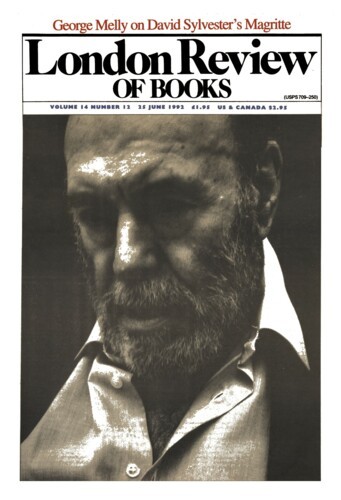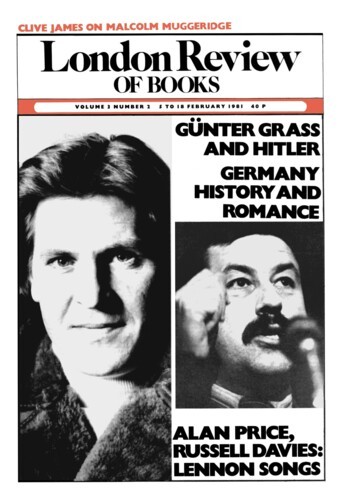Ian McEwan
Ian McEwan‘s new novel, Sweet Tooth, will be published this August.
Ian McEwan writes about his television plays
Ian McEwan, 5 February 1981
I first wrote a television play in 1974 because I wanted to break the isolation of writing fiction. I had no other job and I was far less reconciled than I am now to the essentially crackpot activity of sitting down alone several hours a day with an assortment of ghosts. I envied people who, even while they often complained about each other, collaborated, sped in taxis to urgent conferences; they appeared (I begin to doubt this now) saner and happier for having to do with each other. I thought of writing for television rather than for the stage because, like most people, I had spent far more hours in front of television sets than in theatres; I felt familiar with television’s ‘grammar’, with its conventions and how they might be broken. As a short-story writer I was attracted by its scale, its intimacy. The possibilities and limitations presented by the 30, 50 or even 75-minute television play seemed very close in some ways to those presented by the short story: the need for highly selective detail and for the rapid establishment of people and situations, the possibility of chasing one or two ideas to logical, or even illogical, conclusions, the dangers of becoming merely anecdotal.
Pieces about Ian McEwan in the LRB
Think of S&M: McEwan’s Monsters
Daniel Soar, 6 October 2022
Like a biography of Dickens or Byron, Lessons is nearly cradle to grave: it describes sixty years of a life from the perspective of a man who wants to know what accidents led him to be where and who he...
Sexy Robots: ‘Machines Like Me’
Ian Patterson, 9 May 2019
There’s a very short story by Diane Williams which came into my mind while I was reading Machines like Me, Ian McEwan’s 15th novel. It’s called ‘Machinery’ and...
In the Body Bag: Ian McEwan’s ‘Nutshell’
Adam Mars-Jones, 6 October 2016
Even with the support of the Shakespearean framework the murder plot seems very thin. All the boldness has gone into the choice of point of view, leaving nothing left over for the world outside the womb.
Ways of Being Interesting: Ian McEwan
Theo Tait, 11 September 2014
For some years, I have nursed a modest hope concerning Ian McEwan: that one day he should write a novel without a catastrophic turning point, or a shattering final twist. That for once no one...
Draw me a what’s-it cube: Ian McEwan
Adam Mars-Jones, 13 September 2012
A penis in pickle, and a dreadful wife made to vanish into another dimension by means of an esoteric yoga pose. A narrator who rapes and murders his wife, gratified that the two climaxes coincide...
Oh, the Irony: Ian McEwan
Thomas Jones, 25 March 2010
In 1997 I went to hear Ian McEwan read from his latest novel, Enduring Love, at a café in a deconsecrated church in Oxford. The passage he chose was the now famous opening chapter, with its...
Dissecting the Body: Ian McEwan
Colm Tóibín, 26 April 2007
The penis, in the contemporary novel, has been a mighty matter, looming large. Who will forget the narrator of The Bell Jar seeing an adult penis for the first time and being both fascinated and...
A Knife at the Throat: Meticulously modelled
Christopher Tayler, 3 March 2005
Ian McEwan’s vividly and meticulously imagined novels often focus on characters whose imaginations are either unwholesomely vivid or dryly meticulous. At one end of the spectrum lurk the...
Point of View: Atonement by Ian McEwan
Frank Kermode, 4 October 2001
Minor resemblances between this novel by Ian McEwan and Henry James’s What Maisie Knew have already been noticed and are of some interest. James left a quite full record of the development...
When the Balloon Goes up
Michael Wood, 4 September 1997
A young woman is shaken in her understanding of who she is and what she wants. The walking holiday she and her husband have planned now seems, Ian McEwan says, ‘a pointless detour from her...
Evils and Novels
Graham Coster, 25 June 1992
As Penguin rescues the novels of Angus Wilson from out-of-print obscurity, here is an excuse to recall the argument of his most important work of literary criticism, the essay ‘Evil in the...
Well done, Ian McEwan
Michael Wood, 10 May 1990
There is a scene which recurs in several of Hitchcock’s films and which could well be in all of them, since it is so central to his favourite fear. An innocent man is discovered in a...
Thatcherschaft
Nicholas Spice, 1 October 1987
A Labour victory in the 1987 British General Election would have been a good thing for The Book and the Brotherhood and a disaster for The Child in Time. As it is, with Mrs Thatcher set to...
Playing with terror
Christopher Ricks, 21 January 1982
Ian McEwan’s tale is as economical as a shudder. It never itself shudders, which is one reason why it makes you do so. By staying cool in the face of the murderous madness which it...
Read anywhere with the London Review of Books app, available now from the App Store for Apple devices, Google Play for Android devices and Amazon for your Kindle Fire.
Sign up to our newsletter
For highlights from the latest issue, our archive and the blog, as well as news, events and exclusive promotions.


